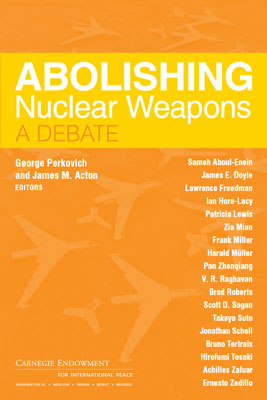Source: Carnegie Endowment for International Peace
IMGXYZ1894IMGZYXIn the past few years, horizontal and vertical proliferation have collided. That is, the need for significant strengthening of the nonproliferation regime in the wake of nuclear developments in North Korea, Iran, Iraq, and Pakistan is now absolutely clear. So too, however, is growing unwillingness among non–nuclear-weapon states to even consider additional measures in what they see as the absence of serious progress by the nuclear-armed states toward disarmament.
The pathbreaking paper Abolishing Nuclear Weapons by George Perkovich and James Acton was first published by the International Institute for Strategic Studies as an Adelphi Paper in September 2008. One of the paper’s major aims was to prompt serious international analysis, discussion, and debate, recognizing divergent views within and between nuclear-armed states and those that do not possess these weapons. The absence of such engagement in official forums such as Non-Proliferation Treaty Review Conferences and the Conference on Disarmament makes it vital for nongovernmental actors to take the lead in hopes that governments will see the value of such dialogue and follow.
The present volume takes the next step. To advance the sort of analysis and dialogue Perkovich and Acton call for, they have invited a distinguished group of experts—current and former officials, respected defense analysts—from thirteen countries, nuclear and non-nuclear, to critique the Adelphi Paper. Their diverse views explore pathways around obstacles to nuclear disarmament and sharpen questions requiring further official and nongovernmental deliberation. Perkovich and Acton are grateful to the contributors for the thoroughly constructive character of their critiques.
Included in this Volume:
- George Perkovich and James M. Acton – Abolishing Nuclear Weapons (reprint)
- Lawrence Freedman – Nuclear Disarmament: From a Popular Movement to an Elite Project, and Back Again?
- Frank Miller – Disarmament and Deterrence: A Practitioner’s View
- Jonathan Schell – The Power of Abolition
- Brad Roberts – On Order, Stability, and Nuclear Abolition
- Harald Müller – The Importance of Framework Conditions
- Bruno Tertrais – Advancing the Disarmament Debate: Common Ground and Open Questions
- Achilles Zaluar – A Realistic Approach to Nuclear Disarmament
- Scott D. Sagan – Good Faith and Nuclear Disarmament Negotiations
- Takaya Suto and Hirofumi Tosaki – Abolishing Nuclear Weapons: A Japanese Perspective
- James E. Doyle – Eyes on the Prize: A Strategy for Enhancing Global Security
- Patricia Lewis – Verification, Compliance, and Enforcement
- Ian Hore-Lacy – Nuclear Power and Proliferation: A Nuclear Industry Perspective
- Pan Zhenqiang – Abolishing Nuclear Weapons: Why Not Outlaw Them First?
- V.R. Raghavan – Nuclear Abolition: Need for a Phased Plan
- Sameh Aboul-Enein – The Roadmap to Total Nuclear Disarmament
- Ernesto Zedillo – The Role of International Institutions in the Disarmament Process
- Zia Mian – Beyond the Security Debate: The Moral and Legal Dimensions of Abolition
The volume concludes with an essay by Perkovich and Acton that works through some of the key questions or paradoxes raised by the critiques. Their focus is on major issues and crucial differences. They do not defend their original text, rebut points, or cite passages to show where they may have been misunderstood. Rather, in the spirit of the commentators, they use the points raised from diverse international viewpoints to clarify and sharpen the big picture.
Few, if any, top-tier issues attract as much simplistic analysis, as many verbal red herrings, and as little serious work by governments as does the feasibility of nuclear disarmament. As was pointed out in Abolishing Nuclear Weapons, none of the nuclear-weapon states "has an employee, let alone an inter-agency group, tasked full time with figuring out what would be required to verifiably decommission all its nuclear weapons."
Perkovich and Acton's endeavor launched with Abolishing Nuclear Weapons, advanced in this volume, and continuing into the future, is to jump-start a broad and deep international debate, based on serious analysis, of what it would take to achieve the immensely important and equally difficult goal of nuclear disarmament. Like this volume, that debate will have to include active participation by all states—non-nuclear as well as nuclear-armed.







